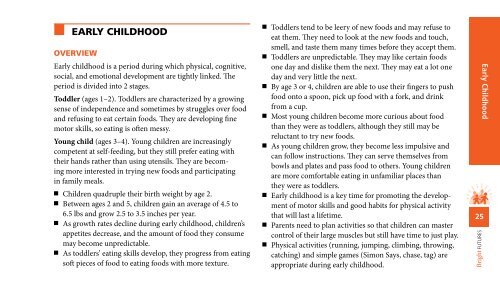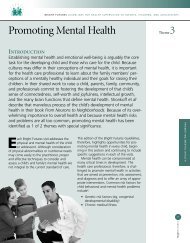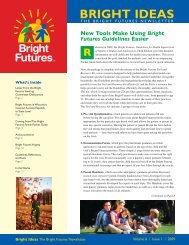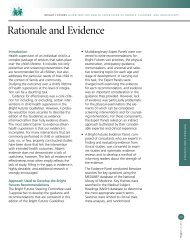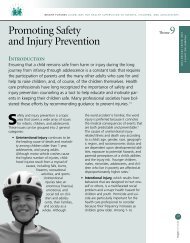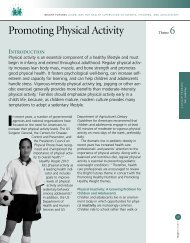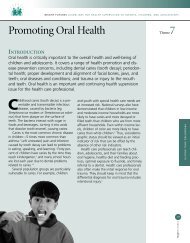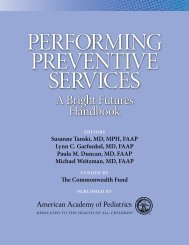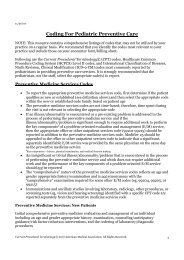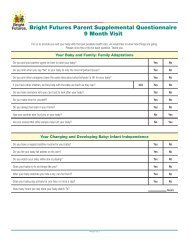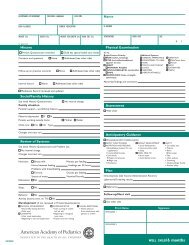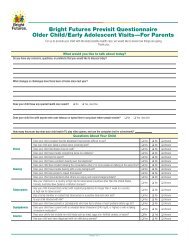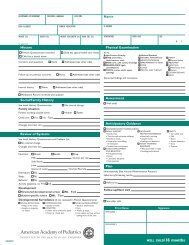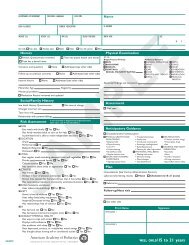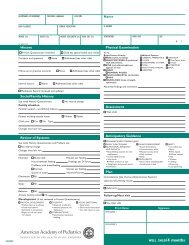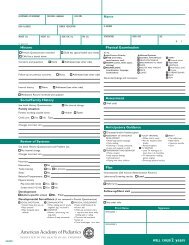POCKET GUIDE - Bright Futures - American Academy of Pediatrics
POCKET GUIDE - Bright Futures - American Academy of Pediatrics
POCKET GUIDE - Bright Futures - American Academy of Pediatrics
Create successful ePaper yourself
Turn your PDF publications into a flip-book with our unique Google optimized e-Paper software.
■■ early Childhood<br />
oVerView<br />
early childhood is a period during which physical, cognitive,<br />
social, and emotional development are tightly linked. The<br />
period is divided into 2 stages.<br />
Toddler (ages 1–2). toddlers are characterized by a growing<br />
sense <strong>of</strong> independence and sometimes by struggles over food<br />
and refusing to eat certain foods. They are developing fine<br />
motor skills, so eating is <strong>of</strong>ten messy.<br />
Young child (ages 3–4). Young children are increasingly<br />
competent at self-feeding, but they still prefer eating with<br />
their hands rather than using utensils. They are becoming<br />
more interested in trying new foods and participating<br />
in family meals.<br />
■ Children quadruple their birth weight by age 2.<br />
■ Between ages 2 and 5, children gain an average <strong>of</strong> 4.5 to<br />
6.5 lbs and grow 2.5 to 3.5 inches per year.<br />
■ As growth rates decline during early childhood, children’s<br />
appetites decrease, and the amount <strong>of</strong> food they consume<br />
may become unpredictable.<br />
■ As toddlers’ eating skills develop, they progress from eating<br />
s<strong>of</strong>t pieces <strong>of</strong> food to eating foods with more texture.<br />
■ toddlers tend to be leery <strong>of</strong> new foods and may refuse to<br />
eat them. They need to look at the new foods and touch,<br />
smell, and taste them many times before they accept them.<br />
■ toddlers are unpredictable. They may like certain foods<br />
one day and dislike them the next. They may eat a lot one<br />
day and very little the next.<br />
■ By age 3 or 4, children are able to use their fingers to push<br />
food onto a spoon, pick up food with a fork, and drink<br />
from a cup.<br />
■ Most young children become more curious about food<br />
than they were as toddlers, although they still may be<br />
reluctant to try new foods.<br />
■ As young children grow, they become less impulsive and<br />
can follow instructions. They can serve themselves from<br />
bowls and plates and pass food to others. Young children<br />
are more comfortable eating in unfamiliar places than<br />
they were as toddlers.<br />
■ early childhood is a key time for promoting the development<br />
<strong>of</strong> motor skills and good habits for physical activity<br />
that will last a lifetime.<br />
■ Parents need to plan activities so that children can master<br />
control <strong>of</strong> their large muscles but still have time to just play.<br />
■ Physical activities (running, jumping, climbing, throwing,<br />
catching) and simple games (simon says, chase, tag) are<br />
appropriate during early childhood.<br />
25<br />
<strong>Bright</strong> FUTURES<br />
Early Childhood


